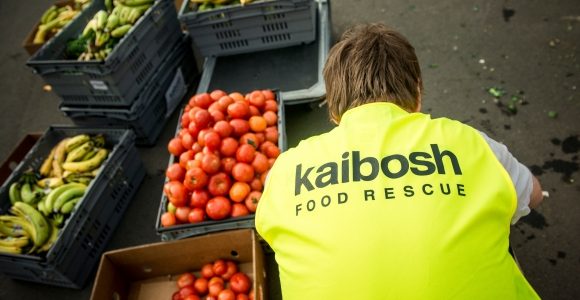31 Mar Kaibosh

Anyone who’s worked in a food business will tell you that plenty of good quality food gets thrown away every day, for all sorts of reasons; it could be approaching its best before date or maybe there’s more of it than is needed. New Zealanders also know that many of us are struggling to make ends meet and that when times are tight, fresh, healthy food can quickly become out of reach.
It doesn’t make sense that we’re throwing away perfectly good food while people in our communities can’t afford to feed themselves and their families. This is where food rescue comes in.
Kaibosh is New Zealand’s first and most well-established food rescue organisation. Their vision is Zero Food Poverty, Zero Food Waste. Working seven days a week in Wellington and the Hutt Valley, Kaibosh rescues over 10,000kg of quality surplus food each month, providing it free of charge to community groups supporting people in need. This equals more than 28,000 meals, as well as a monthly carbon emission reduction of 7,785kg.
By bringing together 36 community groups, 30 regular food donors and over 100 dedicated volunteers, Kaibosh connects this food with those who need it most, benefiting both our community and our environment. They create meaningful opportunities for businesses and volunteers to give back, while also making sure that community groups can focus their funding on providing vital services, rather than on buying food.
Instead of giving food directly to individuals, Kaibosh believes in working with community groups that provide a range of support services, like budgeting advice, housing assistance, health care and counselling. Having access to these services means that the underlying causes of food poverty can be worked through with the aim of creating meaningful, long-term change in peoples’ lives.
Since its inception in 2008, Kaibosh has rescued more than 467 tonnes of quality surplus food. This translates to 1.3 million meals provided to people in need as well as a 363 tonne reduction in carbon emissions.
Kaibosh strives to provide as much fresh produce as possible with 57% of all food rescued being fruit and vegetables. They also focus on keeping the quality of the food high, with volunteer food sorters making sure that community groups get food that’s ready to use – whether that means going straight into a food parcel or being cooked into a meal for those in need. Any food that doesn’t make the grade is given to an animal sanctuary or composted and all food packaging is recycled.
Kaibosh has played a big part in helping food rescue organisations set up in other parts of New Zealand, and hopes to see many more in years to come. You can find out more about Kaibosh by visiting www.kaibosh.org.nz.
Nā Jessica Meads



